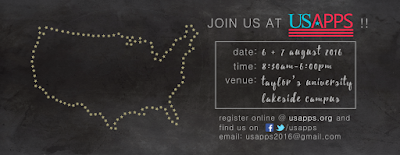Here is an opinion piece on the US admission by an anonymous writer, who likes to remind everyone to pray for the best and prepare for the worst.
TL;DR: Start early, as early as you are one; pray hard for inspiration and luck, as hard as it will make you win the lottery.
Reflection & Life—If, if, if…
TL;DR: Start early, as early as you are one; pray hard for inspiration and luck, as hard as it will make you win the lottery.
If I could start my U.S. universities’
application all over again, I would choose to prepare since I was seven years
old.
Yes, seven.
At that age, unfortunately, I never thought
going to the U.S. was possible given the expensive tuition fees, which cost approximately
1 mil MYR. But when I started to think about applying to the U.S., everything
was too late.
Holistic admission
During Form 5, a friend of mine, who was a
U.S. graduate gave a few of my friends some insights into the U.S. application.
How intimidating! My first impression was the tough application and admission
game. One needs exceptional grades, exceptional extracurricular activities,
exceptional SAT scores, exceptional teacher’s recommendation letters. I thought
had none of the aforementioned criterion. Soon, I gave up.
If I ever start to prepare for the SAT and
involve in research or any international extracurricular activity.
Two years before application cycle
I told another friend who is studying in
U.S. about my intention in applying to U.S. top universities. He said it is too
late now. Everything was almost in place already. The only thing that could
change my fate was the essay. I thought about it, why not just settle for U.K.?
I had never been a terrific writer too. Again, I gave up.
If I ever read more during my childhood and
practise more on writing.
The silver lining
The clarion call was “Oh see! JPA
scholarship allows you to pursue your dream. (Not the case anymore.)”
Of all the research I have done, I realised
there is only one point that would highly increase one’s chance to gain
admission—his or her passion. And this attribute could shine through by
crafting a killer essay. Essays were said to weigh the heaviest in assessing a
candidate’s success in gaining admission. Admission officers (AOs) may agree,
but some may not, claiming that they look a candidate’s overall statistics.
Essays matter. But I guess you still need to have exceptional results before
AOs bother to see your essays. The easiest way out is to be an Olympic athlete.
Recruited athletes generally have average statistics and mediocre essays. Unfair
as it may seem but they have a special ability (or superpower to the
university) to offer, do you?
If at the age of seven, I started training
competitively for any sport, be it badminton, running, tennis etc.
A year before application cycle
I then became serious about applying to the
U.S.. This was the time when I started to prepare for the application.
Grades aside, it was time to be the next
Charles Dickens.
I bought books related to university
application essay writing and sample essays from people who were accepted to
Harvard. If you do so, get ready to be disappointed. The essays did not offer
me much insight. They were mediocre. But let me assure you those people could
probably have astronomical achievements. Apart from having perfect CGPA and SAT
scores, he ran marathons in Olympic; he built a billion-dollar company; he
played in Carnegie Hall; he built a nuclear reactor; he built houses for
Africans; he won the champion for Google Science fair; he is fluent in German,
Russian, French, Japanese, Arabic, Chinese and English. What is scarier than
all the he’s I mentioned were the
same guy—the guy who saved the world, Superman.
Don’t be shocked. He was groomed this way
since he was three, or was it two years old?
Ponder over the head-start he had over you,
how can you compete with him?
Survivorship bias
Be warned: do not fool yourself into
believing stories telling you how lucky someone who managed to gain admission
into MIT despite having average grades. Think rationally. Let’s assume MIT’s
admission rate is 5%. Among the 1,700 students who were admitted, 10% are
international students, which is 170 students. If MIT receives approximately
10,000 international applications.
What is the admission rate?
1.7%.
How can you stand out among the 10,000
applicants?
“My story is unique”, “I might be lucky”, “I
heard that Lin Zhi Ping got in with an SAT of 2100, my score is 2390, I should
stand a chance”.
The Harry Potter series has always been a
best seller. J.K. Rowling is a marvellous author! But in truth, for every J.K.
Rowling, there are 100 writers who never had their books on the best seller
list. And for every of the 100 writers, there are 1,000 writers who never had
their books published. And for every of the 1,000 writers, there are 10,000
writers who are dreading to complete their masterpiece. And for every of the
10,000 writers, there are 100,000 writers who are thinking of writing a book.
You only hear of J.K. Rowling. It’s
entirely not your fault: the society made us perceive it this way, whereby you
only heard of success stories, but never heard of people who tried so hard yet
failed. These people do exist. They do.
Of course, you should not be penalized for
thinking so. In fact, for every student who scored 2100, there may be 10
students who scored 2400 who were rejected, and the list goes on and on…
Everything boils down to luck. We never
know what the AOs are looking for, but I am inclined to think that they are
trying to build a diverse class of people. Keep this in mind.
And he cuts short at here abruptly, probably more to come.
((Secretly I think he wishes everyone the best in their applications!
















